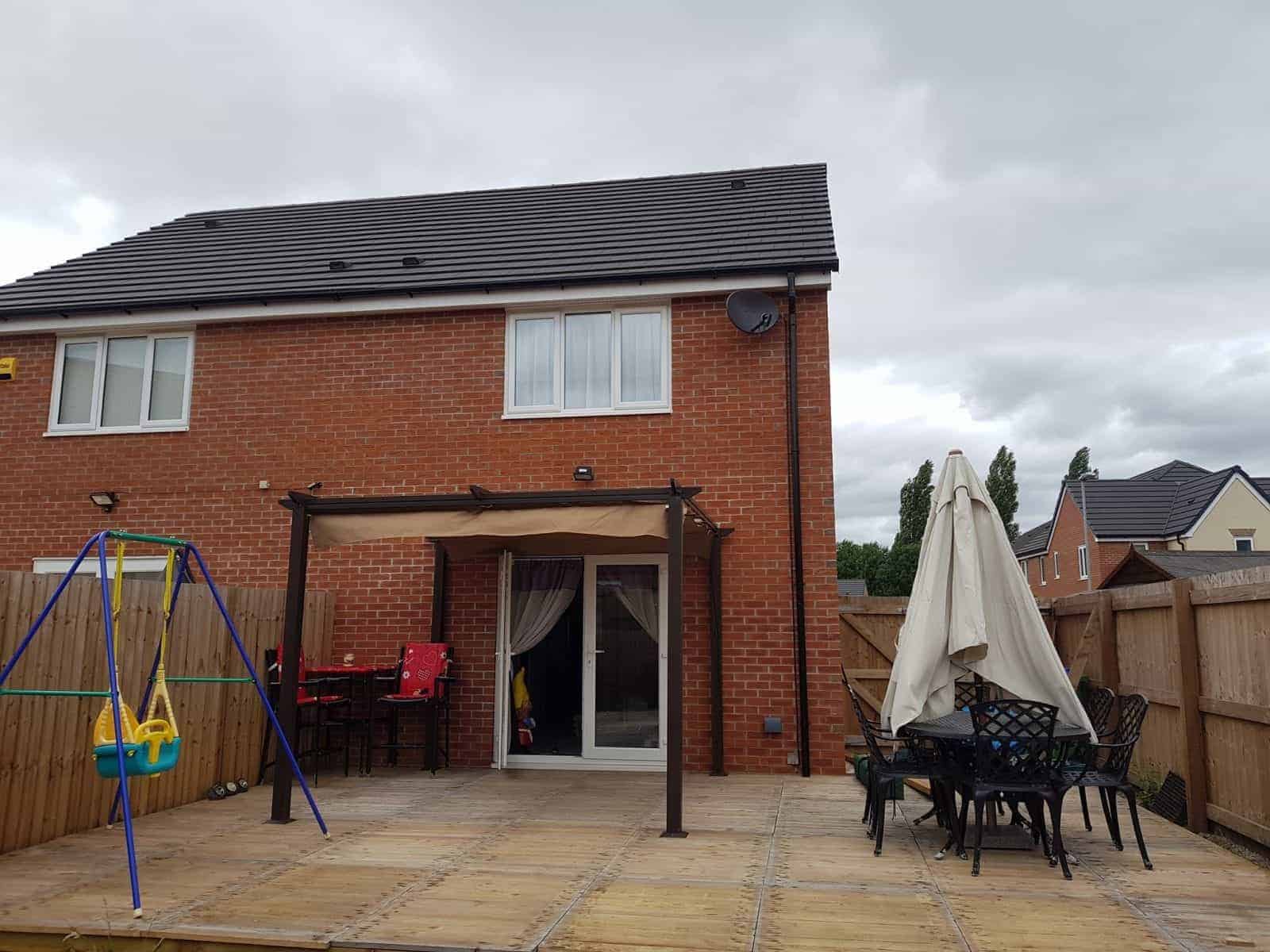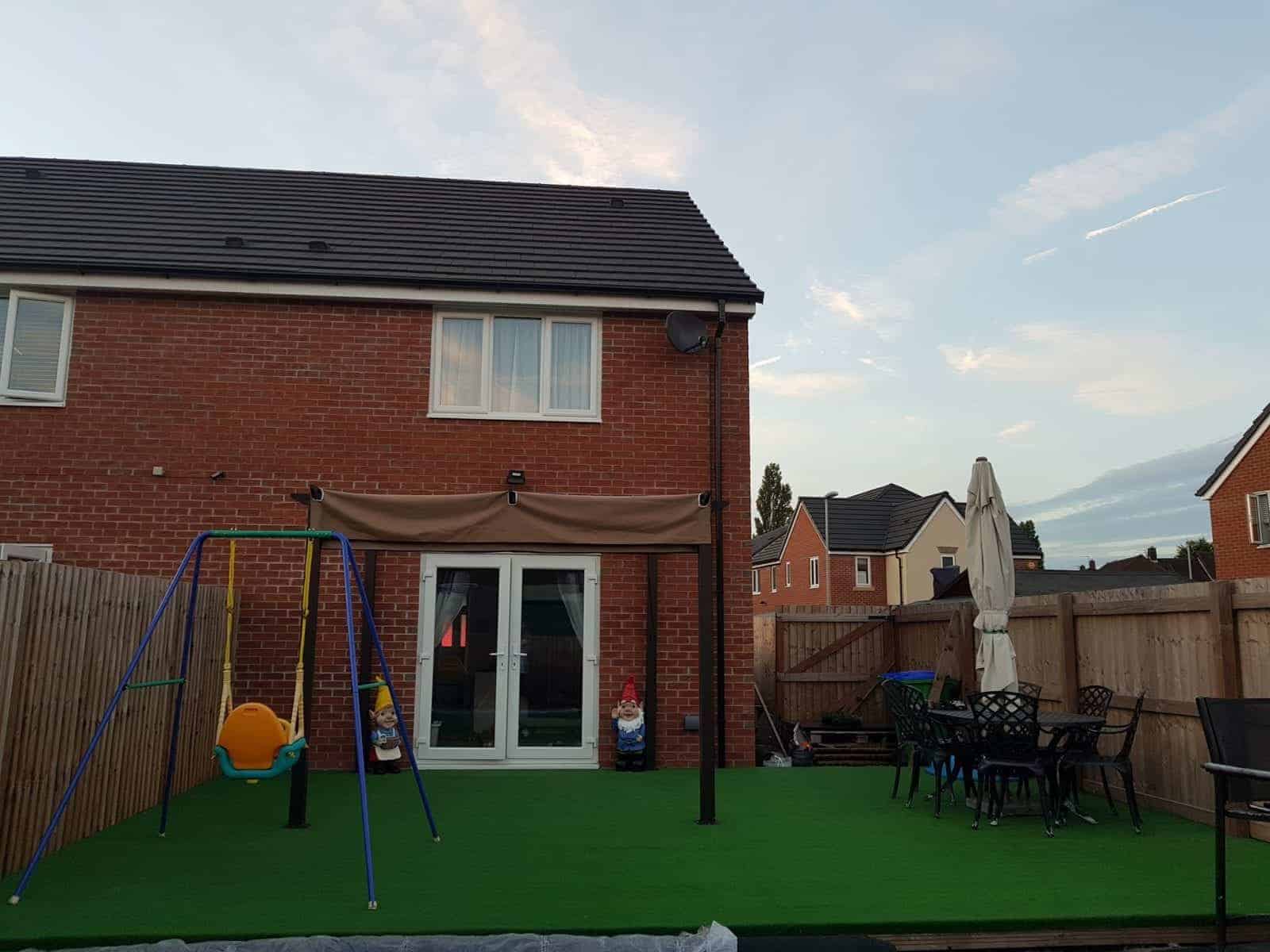5 min read
Last updated: November 29, 2023
In the last decade, decking has been a popular choice for many homeowners looking to create a unique outdoor space. However, over the years, decking can start to look worn and outdated. Artificial grass is a great way to update your decking and create a fresh, new look that will last for years.
Covering your tired decking with synthetic turf is a perfect, simple and effective way of brightening up your outdoor space. Not only will it transform the look of the garden, but it will also provide you with a soft, dry and usable space that the whole family can enjoy.
How do you lay artificial grass on decking boards?
Before we get started with our step-by-step guide, we have a couple of pieces of advice for you.
Choosing your artificial grass
A couple of things you may wish to consider before installing fake grass onto decking is the gaps on your decking – if you choose a shorter piled artificial grass you may see the dips across the lawn so choosing a product with a pile of 30mm and above would be better for you.
There are other options to stop the dips which include; flat plywood laid on top of the decking, or a shock-pad underlay.
Don’t forget about drainage
You need to consider drainage for your artificial lawn too – if the surface is completely flat with no gradient and we have a large downpour you may start to see puddles. If it does have a gradient, the water will run off the lawn with no problem. You also need to be conscious of this when applying your adhesive as you don’t want to trap the water completely so it’s important to leave gaps in the glue.
That being said, fitting fake turf onto decking is a lot easier than you may think! Please follow our below step-by-step guide to achieve the perfect finish.
Tools & Materials for the job
- Joining Tape
- Joining adhesive
- Fixing pins
- Hammer
- Artificial grass rolls
- Shockpad underlay
- Heavy Duty Retractable Knife
- Measure tape
- A staple or nail gun
- Optional sand in-fill
Step 1: Clean up the decking boards.
Use a brush or power washer to remove any dirt, moss, weed or debris from the decking boards. This will ensure that the synthetic grass has a clean and level surface to be laid on.
Step 2: Cut the fake grass and the underlay to size.
Using your tape measure and a cutting knife, cut the fake grass to size. Make sure to leave a few inches extra on all sides, just to give you some wiggle room.
Step 3: Lay down the shockpad underlay and secure it
Roll out the shockpad underlay and cut to size, using your knife or scissors. This will provide a soft and spongy surface for the synthetic grass to be laid on. After that, use either a staple or a nail gun to fix the underlay onto the decking.
Step 4: Lay down the synthetic grass and secure it
Roll out the artificial turf on top of the shockpad underlay. You can make sure it’s completely flat by walking over it and leaving it to settle for a couple of hours. Once you’re happy with the position, use some joining tape and adhesive to join any pieces of fake lawn together. Using any fixing system of your choice (staples, nails, fixing pins or even glue), fix the brand-new faux grass onto the decking.
Important Note: We often get asked about a sand in-fill. This is not needed. Sand or rubber-crumb in-fills are only ever used in sports environments. The only exception to this is using sand to add weight to artificial grass to protect against windy conditions. Modern artificial grasses include a thatch. This is a layer of curled brown blades that not only add realism but also give structure to the artificial grass, which was one of the original reasons older artificial grasses used sand.
Final step: Enjoy your new outdoor space!
Give your new artificial lawn a little brush, to get rid of loose fibres and give the grass blades a little lift. And that’s it! You’ve now successfully laid artificial grass on the decking. All left to do is sit back, relax and enjoy your new outdoor space!
Frequently Asked Questions
Will decking rot under artificial grass?
Decking is unlikely to rot under artificial grass if proper measures are taken. Ensuring effective drainage to prevent water accumulation, using breathable materials for the artificial grass, choosing water-resistant decking, and conducting regular maintenance can all help in preventing rot. Good ventilation around and under the decking also plays a crucial role in keeping the area dry, further reducing the risk of rot. With these precautions, artificial grass can be safely installed over decking without causing damage.
If you have any questions or need any assistance, please don’t hesitate to contact our team of experts.


Related Category: Installation & Maintenance
